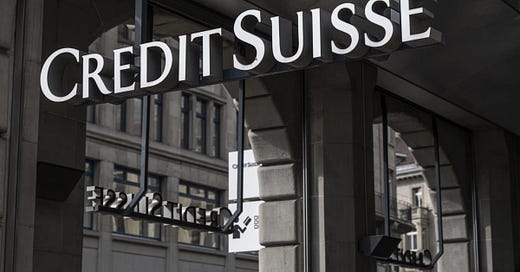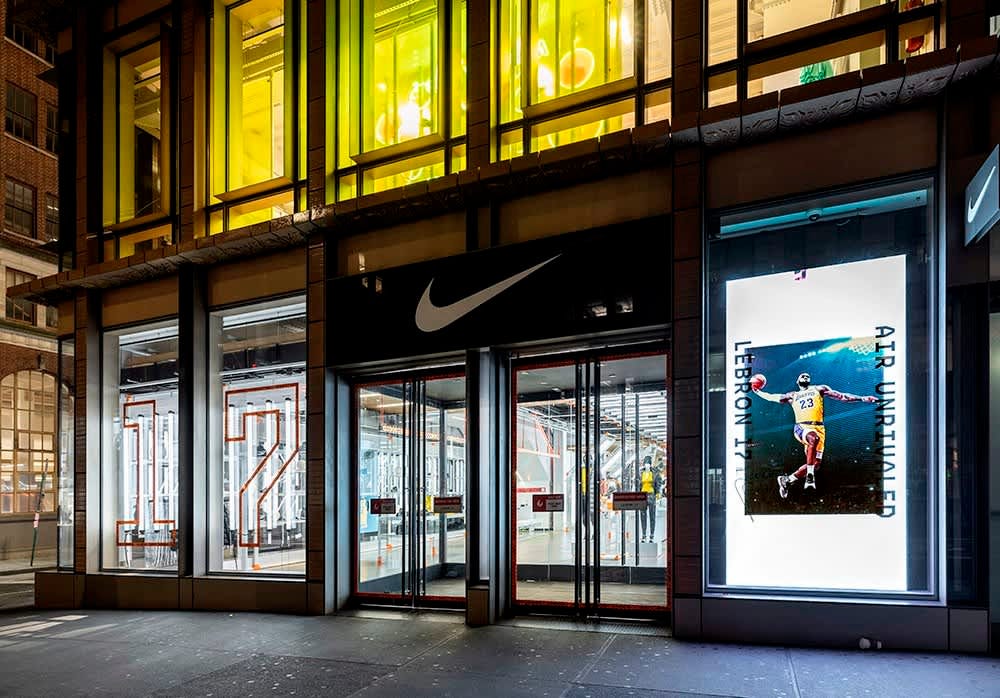Week 11: Banking contagion spreads
Credit Suisse collapses, Nike reports strong revenue growth, Fed shows sign of slowing interest rate hikes
💡Did you know? With its crude oil reserve, Aramco possesses a staggering stockpile of 261.1 billion barrels, surpassing what ExxonMobil controls by more than tenfold. Aramco commands possession of one in every eight barrels of the world's oil supply.
📈Market Rundown
Credit Suisse: Abrupt end to a 167-year-old institution
📝 Quick Recap:
Credit Suisse has had its fair share of troubles over the past decade, which have impacted its profits and reputation:
Fined $536 million for violating U.S. sanctions against Iran, Sudan, and other countries
Paid $5.3 billion to settle claims that the bank misled investors about the quality of mortgage-backed securities it sold prior to the 2008 financial crisis.
Failed to prevent Bulgarian cocaine traffickers from laundering money via the bank
Fined $475 million for a corruption scandal in Mozambique
Lost ~$15 billion in investments as Archegos & Greensill Capital collapsed
As a result of this string of misfortunes, investors withdrew $120 billion from Credit Suisse in the last few months of 2022, citing a loss in confidence in the bank.
The situation worsened earlier this month after the collapse of Silicon Valley Bank. Investors were scouring for weak spots in the financial system, and, unsurprisingly, Credit Suisse was on top of that list.
The straw that broke the camel’s back — Saudi National Bank, Credit Suisse’s largest shareholder, refused to invest additional capital, creating a massive panic among investors. Investors started withdrawing large sums of capital from the bank. At a point in time, Credit Suisse was losing $10 billion in assets every day!
Swiss regulators provided Credit Suisse with a $50 billion lifeline to alleviate the situation but to no avail. Credit Suisse’s shares plummeted further. Regulators had to broker a deal between UBS and Credit Suisse to prevent a widespread crisis and restore confidence in the Swiss banking system.
Implications of Credit Suisse’s collapse?
The collapse of Credit Suisse and Silicon Valley will certainly impact Fed’s decision to hike rates further. The Fed is in a difficult position here — how should it tame inflation without sparking a major banking crisis?
The UBS-Credit Suisse merger will create a major concentration risk in the Swiss banking system — The merged entity (in terms of assets) is approximately double the size of the Swiss economy. If a single large bank in a small economy experiences a bank run or requires a bailout, as UBS did during the 2008 financial crisis, the government will be unable the rescue the bank — yikes!.
Nike: Pushing through the inventory glut
📝Quick Recap:
Nike's earnings beat market expectations (EPS $0.79 vs. $0.55 expected). The primary driver behind the positive news is the strong revenue growth.
Nike's revenue for the quarter was $12.2 billion, representing a 6% increase from the same period last year. This impressive growth was driven by strong demand for the brand's products in North America and China. Nike's digital sales also saw a significant increase, with a 36% growth in online sales.
Nevertheless, Nike still faces significant challenges on two fronts:
High Inventories: During the pandemic, Nike's sales soared due to lockdown-driven purchases, which drove the firm to build its inventory. However, with the current economic climate, the firm is sitting on a large inventory that it desperately needs to offload. In fact, its inventory increased by 16% from this time last year. The management is confident that Nike will "exit the year with healthy inventories across the marketplace," but such a feat is difficult to achieve as consumer spending dries up. The market will continue to monitor Nike's inventory levels in the coming months to understand the situation at Nike better.
Supply Chain Challenges: Nike has been impacted by ongoing global supply chain disruptions and is facing higher costs for materials and transportation, which have been eating into its profit margins. The firm is taking active steps to address the supply chain issue, but supply chain issues are here to stay in the short term as firms across different industries battle rising costs.
Fed: Slowdown and Observe
📝Quick Recap:
Fed enacted a quarter-point increase in interest rates in light of the recent banking crisis, indicating a possibility of a slowdown in rate hikes. Fed's stance on raising interest rates has softened in the past month as the rate hikes have had massive repercussions in the banking system. For instance, the recent 0.25% rate hike came in half a point below what the Market expected before the collapse of Silicon Valley Bank, Credit Suisse, and other financial institutions.
Now, the Fed has a difficult problem to tackle — how to curb inflation while preventing additional bank collapses.
🗒Weekly Headline Summary
Asia
India cenbank has 'enough valid reasons' to pause rate hikes in April – ISEC PD|RT
Hong Kong on watch for any 'spillover' from US regional banks|RT
Beyond Asia
Big Oil Eyes New Deals in North Africa Amid Rising Energy Demand|WSJ
Crypto Faces Legal Reckoning as SEC Prepares Action Against Coinbase|WSJ
Black Swan Funds Have a Moment as Investors Hedge Market Doom|BB
Corporate Debt Becomes Market of Haves, Have-Nots: Credit Weekly|BB
Copper price to surge to record high this year, Trafigura forecasts|FT









